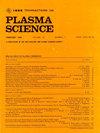Optimum Placement of High Energy Inductors for Capacitive Pulsed Power Supplies of Electromagnetic Launchers
IF 1.5
4区 物理与天体物理
Q3 PHYSICS, FLUIDS & PLASMAS
引用次数: 0
Abstract
In an electromagnetic launcher (EML) system, a high amount of energy must be supplied in a short time period to provide the necessary acceleration for the projectile. This type of energy is generally provided by many capacitive pulsed power supply (CPPS) units that are connected in parallel. Since the shaping inductors of different modules are placed close by to achieve a compact design, their magnetic fields affect each other. If this magnetic coupling causes a high enough negative induced voltage in nonconducting modules, the freewheeling diode may fail if the particular module is fired as its diode is open. Thus, protection systems that avoid the activation of modules while their diodes are in conduction are used in EML systems. The protection system avoids the fault but decreases the supplied energy. This study proposes a design methodology that determines the positions and orientations of shaping inductors to avoid semiconductor faults with a compact power supply design. The design procedure starts by determining the physical dimensions of possible inductors considering the minimum inductance value and maximum allowed lateral electromagnetic force. Then, the distances between the inductors are systematically determined by an iterative approach by considering the different predefined orientations. In this method, 3-D FEA models are used to calculate the inductance matrix, which is then used to estimate the induced voltages in other inductors as well as in the system-level simulation models.电磁发射器电容式脉冲电源高能电感器的优化布置
在电磁发射器(EML)系统中,必须在短时间内提供大量能量,以为炮弹提供必要的加速度。这种类型的能量通常由并联连接的许多电容脉冲电源(CPPS)单元提供。由于不同模块的成型电感器放置在附近以实现紧凑的设计,因此它们的磁场相互影响。如果这种磁耦合在非导电模块中引起足够高的负感应电压,那么如果特定模块在其二极管开路时被点燃,则续流二极管可能会失效。因此,在EML系统中使用了在二极管导通时避免模块激活的保护系统。保护系统避免了故障,但减少了提供的能量。本研究提出了一种设计方法,该方法确定整形电感器的位置和方向,以通过紧凑的电源设计避免半导体故障。设计程序从考虑最小电感值和最大允许横向电磁力来确定可能的电感器的物理尺寸开始。然后,通过考虑不同的预定义方向,通过迭代方法系统地确定电感器之间的距离。在该方法中,使用三维有限元分析模型来计算电感矩阵,然后使用该矩阵来估计其他电感器以及系统级仿真模型中的感应电压。
本文章由计算机程序翻译,如有差异,请以英文原文为准。
求助全文
约1分钟内获得全文
求助全文
来源期刊

IEEE Transactions on Plasma Science
物理-物理:流体与等离子体
CiteScore
3.00
自引率
20.00%
发文量
538
审稿时长
3.8 months
期刊介绍:
The scope covers all aspects of the theory and application of plasma science. It includes the following areas: magnetohydrodynamics; thermionics and plasma diodes; basic plasma phenomena; gaseous electronics; microwave/plasma interaction; electron, ion, and plasma sources; space plasmas; intense electron and ion beams; laser-plasma interactions; plasma diagnostics; plasma chemistry and processing; solid-state plasmas; plasma heating; plasma for controlled fusion research; high energy density plasmas; industrial/commercial applications of plasma physics; plasma waves and instabilities; and high power microwave and submillimeter wave generation.
 求助内容:
求助内容: 应助结果提醒方式:
应助结果提醒方式:


